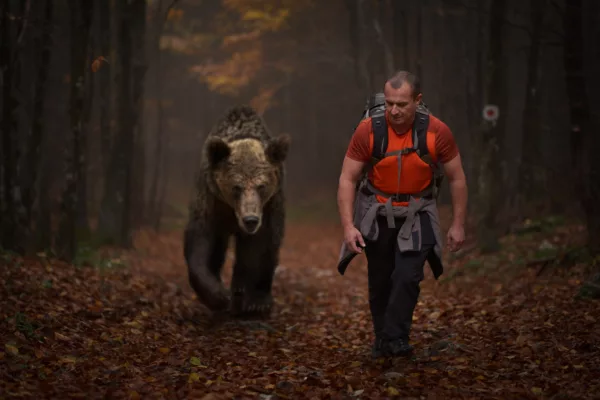The Happy Camper: My Love Affair with Algonquin

I’ve always had a soft spot for Algonquin. To me, it’s the quintessential gateway to Canadian wilderness.
Memories abound of time spent in the park. Spring canoe trips in search of trophy-sized trout; fall backpacking trips while the leaves are changing colour and the nights are getting cool; pulling a toboggan full of winter gear across a frozen lake, where the sense of aloneness seems to go on forever; and even pitching a tent in busy a campground and camping beside complete strangers—who quickly become friends for life.
Algonquin offers all that, and more, to thousands of people each year. It’s enough semi-wilderness to satisfy the soul and enough brilliance to inspire many of us to search for even wilder places beyond. Long portages and somewhat busy campgrounds be damned—I still love Algonquin, and always will.
It was actually the crowds of tourists that initially helped protect Algonquin. It was the devoted anglers, renowned artists and the wealthy vacationers who arrived by train and stayed at lavish hotels. They all loved it there and grew concerned over the encroachment of agriculture and the depletion of fish and game. The dream was to protect the half-dozen watersheds that gave birth to the main rivers that flushed out of their familiar piece of paradise. They succeeded—Algonquin Park was formed in 1893.
At the time, it was considered the most significant wilderness park in all of Canada; a place that was twice the size of the province of Prince Edward Island and was promoted as the largest tract of dedicated bush in the world.
Since its creation, Algonquin has more than doubled in size, from 3,797 square-kilometres to 7,630 square-kilometres; it’s changed names from Algonquin National Park to Algonquin Provincial Park (becoming Ontario’s first provincial park); and altered its borders eight times. Along the way, the original intent hasn’t changed much. Park commissioners set out a plan well over one hundred years ago: to maintain the watersheds, protect and encourage the growth and increase of the birds and animals, maintain the park in a state of nature (as far as possible), do field experiments in systematic forestry to a limited scale, secure a sanitarium or a respite for health and to study the beneficial effects on the protection of a large forested area and climate. Yep, seems it hasn’t changed much—and isn’t it interesting that they were concerned about people’s health and climate change even back then?
The popularity of Algonquin has continued to grow since its creation and there’s no sign of it slowing down. The average visitation is well over half-a-million per year.
People worship this place. The devotion its fans give to the park far exceeds the loyalty others would give to their favourite rock band, hockey team, grade-school teacher or even lover. Songs have been written, art created, books published, poems scribbled, theatre performed, films produced, a symphony established, clubs gathered and websites generated. Algonquin Park is world-renowned. Everyone seems to know about it. If you mention any other larger, and wilder place in Canada, you won’t get the same response or the same fidelity that Algonquinites give to their park. Simply put, this remnant piece of semi-wilderness, a mere two-hour drive from Toronto International Airport, wouldn’t be here if so many people didn’t love it.
“Algonquin Park, so wild and free,
You’ve got a lariat on me,
It’s forest aisles and temples grand,
Immortal shrines, not made by hand.
Oh, Mother Nature, hold my hand,
And guide me thru this mystic land,
And let me know and understand,
Why this paradise was planned.
On rugged hills, the towering pines,
Nod in the fragrant ozone winds,
Bearing pine-laden zephyrs of health.
To cheeks that wore the shade of death.
Algonquin’s lakes and rippling streams,
Haven of rest and soothing dreams,
On this the Master stamped his brand,
And christened it, God’s fairy-land.”
—John W. Millar (1927), Poet and Algonquin Park superintendent














